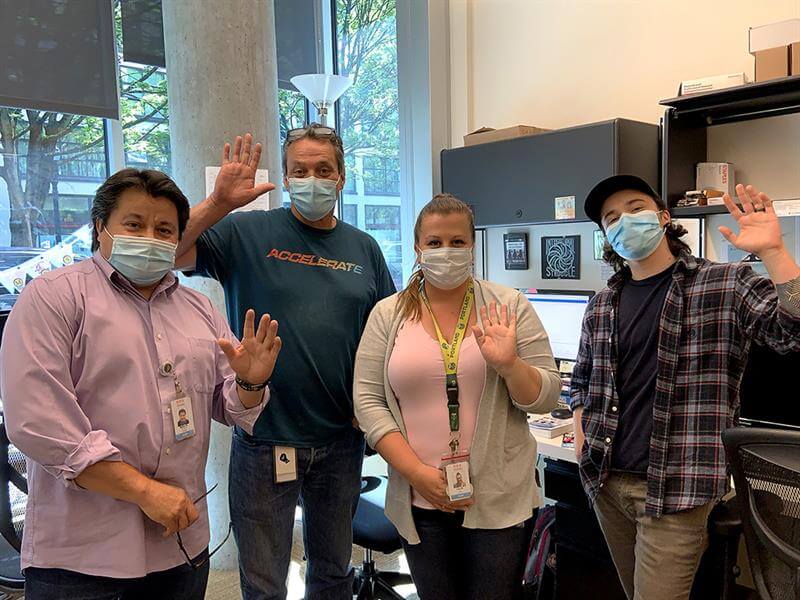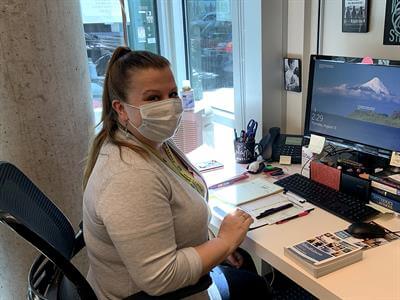This content block does not have a preview.
During a year of unprecedented challenges, CCC has continued to safely and compassionately serve our more than 13,000 clients, patients and residents – who rely on us to keep the doors open, now more than ever. And we couldn’t do it without our supporters, who ensure we can continue serving our neighbors in need. Please consider making a year-end gift to keep our wraparound services strong as we look ahead to 2021. Together, we’re transforming lives.
The members of Central City Concern’s Community Engagement Program (CEP) are hard to corral in one place.
That’s because the team meets clients where they’re at – both figuratively and literally. They’re usually on the go, checking in with clients all over Portland – on the street, in shelters and in apartments. These days, their travel is limited by COVID-19 related safety restrictions, and clients are more likely to come to them directly at CCC’s Old Town Recovery Center.
But the CEP team is still maintaining strong connections, meeting needs and finding success.
CEP clients are some of the most vulnerable members of our community. The program supports chronically homeless individuals with physical, mental and addiction issues in gradually moving toward self-sufficiency and stability. They follow a “housing first” model, which means they recognize access to housing as a critical first step, before addressing issues like substance use. For clients and staff alike, the journey can be long, with lots of detours. It takes perseverance, flexibility and creativity. But most of all, it takes strong relationships.
“It’s about dignity. When I walk away knowing there’s mutual respect, and [clients] feel like they’re not being judged, that’s a success,” said Eric Oswald, CEP Manager.
At the beginning of the pandemic, those connections were strained. For many CEP clients, just accessing a phone – let alone attending online appointments – was a challenge. Suddenly, CEP staff couldn’t just pop over to a client’s room, either. Mitch Bender, CEP Housing Support Specialist, was trying to connect with clients over the phone to fill out housing applications and meet deadlines – but landlords were still demanding original copies, delivered through the mail. Previously, he could hop on his bike to speedily hand-deliver an application; now, offices were closed. The usual systems didn’t work.
“Landlords, community partners, our team – we all had to adjust and get a lot more flexible about communication and timeframes,” Bender said.
 The CEP team is committed to supporting clients in gradual movement toward self-sufficiency. “Harm reduction is at the heart of everything we do. We’re able to meet clients where they’re at,” said Case Manager Rene Stewart. (From left: Martin Estrada, Eric Oswald, Lisa Newport and René Stewart. Not pictured: Mitch Bender, Stephanie Bergman and Angelisa Thompson.)
The CEP team is committed to supporting clients in gradual movement toward self-sufficiency. “Harm reduction is at the heart of everything we do. We’re able to meet clients where they’re at,” said Case Manager Rene Stewart. (From left: Martin Estrada, Eric Oswald, Lisa Newport and René Stewart. Not pictured: Mitch Bender, Stephanie Bergman and Angelisa Thompson.)
To improve communication, the team purchased phones for nearly all 70 CEP clients early in the pandemic. That was effective for clients who could keep track of personal possessions and keep their phones in working order. For others, the team has adapted for safer face-to-face meetings. Like other CCC teams, CEP staff wear face masks and shields when visiting clients in the community. They’ve staggered their work schedules so that there are fewer people onsite at once. But for clients who need unscheduled support, there is always a counselor on duty.
Last Monday, the counselor on duty was case manager Martin Estrada.
“It was like the floodgates opened,” Estrada said. He spent the day connecting clients to resources, including food and hygiene items, replacement phones, Ride-to-Care vouchers and bus tickets.
And the CEP team is drawing on a major strength these days: their ability to work collaboratively. Since the program’s founding 20 years ago, team members have always held morning huddles to share ideas about supporting clients who need extra assistance. So if a client is in crisis, they can get immediate help – even if their assigned case manager is working remotely that day.
“There’s a sense of familia here,” said Estrada.
 Peer Support Specialist Lisa Newport has been delivering food boxes, medications and more to clients during the pandemic, and helping connect them to health providers and other resources. She is passionate about CEP’s work. “It feels really good when you see someone [who has been homeless] living somewhere you’d want to live. They deserve that,” she said.
Peer Support Specialist Lisa Newport has been delivering food boxes, medications and more to clients during the pandemic, and helping connect them to health providers and other resources. She is passionate about CEP’s work. “It feels really good when you see someone [who has been homeless] living somewhere you’d want to live. They deserve that,” she said.
For CEP clients, housing is a big piece of the puzzle – and the team has continued to successfully place clients in temporary and permanent housing, even during the pandemic. But a safe place to live is really just a starting place, said Bender.
“Once a client is inside, they’re safer, have more stability, aren’t being hassled by cops, don’t lose their belongings every week…but there’s so much more to address,” he said.
Many CEP clients have histories of trauma, isolation and a lack of community and social support in addition to their physical, mental health and substance use needs.
“As soon as you’re alone in an apartment, it’s so different from the streets, shelters, transitional institutions. It’s quiet. Stuff comes up,” Bender said. That has been a major challenge for the mental health of clients who are in new apartments, but have fewer community resources — and distractions — at their disposal thanks to COVID-19 related program shutdowns.
The CEP team has found themselves fielding more frequent calls from clients, who are reaching out more often than before. Bender said one of the team’s strengths is their built-in flexibility: they are already accustomed to providing wraparound care and going the extra mile for clients. That means they’ve been able to adapt.
“We can stretch our resources, go just a little bit further [than other programs],” said Bender. “We can give people second and third and fourth and fifth chances.”
“The main thing is that our clients aren’t invisible. You can see it in their eyes — I guess you call it hope,” Estrada said. “That’s the crown jewel of what we’re doing here.”
 Mitch Bender, the team’s housing support specialist, has helped more than a dozen people transition into new homes during the COVID-19 pandemic. “Landlords, community partners, our team – we all had to adjust and get a lot more flexible about communication and timeframes,” Bender said.
Mitch Bender, the team’s housing support specialist, has helped more than a dozen people transition into new homes during the COVID-19 pandemic. “Landlords, community partners, our team – we all had to adjust and get a lot more flexible about communication and timeframes,” Bender said.